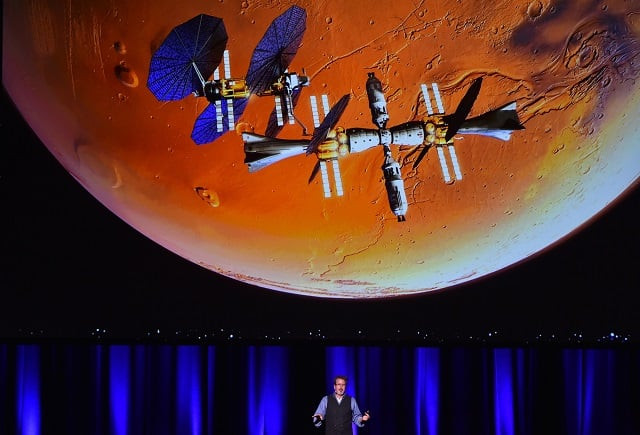Space 'science laboratory' finds a new way to explore Mars
Lockheed Martin has been working on its "Mars Base Camp", a science laboratory that will orbit the planet

Lockheed Martin's human spaceflight strategy chief Rob Chambers speaks during a presentation of a planned mission to Mars at the 68th International Astronautical Congress 2017 in Adelaide on September 29, 2017. A reusable lander powered by water will allow humans to explore the surface of Mars, defence giant Lockheed Martin said on September 29 as it unveiled new details about a push to reach the Red Planet in about a decade. PHOTO: AFP
Governments and private firms are collaborating on projects to send humans to new frontiers, with NASA planning missions next decade into the space between Earth and the Moon to prepare for trips to Mars.
Lockheed Martin has been working on its "Mars Base Camp", a science laboratory that will orbit the planet, with the crewed lander set to descend to the surface on repeated missions.
World not coming to an end today, assures NASA
"It looks a bit like Jules Verne, but it's actually more like an aircraft that we've flown in the past," Lockheed Martin's human spaceflight strategy chief Rob Chambers said, at a gathering of the world's leading space experts in the Australian city of Adelaide.
Up to four astronauts could join each two-week surface mission, while liquid hydrogen generated from water would fuel the spacecraft, he added.
"We can create that fuel. We can power this entire spacecraft system just with water," said Chambers, describing it as a "water-based economy".
Lockheed Martin is among several companies working on deep space habitats with NASA, which hopes to send the first astronauts to Mars in the 2030s.
NASA spacecraft to end its journey by plunging into Saturn
Chambers called the Mars vision "a transformational event for our generation", adding: "It's literally (the) dawn of the new age of discovery about ourselves and about our solar system and about our place in it."
The International Astronautical Congress concludes on Friday with a presentation by SpaceX's Elon Musk, who will outline a new design for an interplanetary transport system to take humans to Mars.



















COMMENTS
Comments are moderated and generally will be posted if they are on-topic and not abusive.
For more information, please see our Comments FAQ